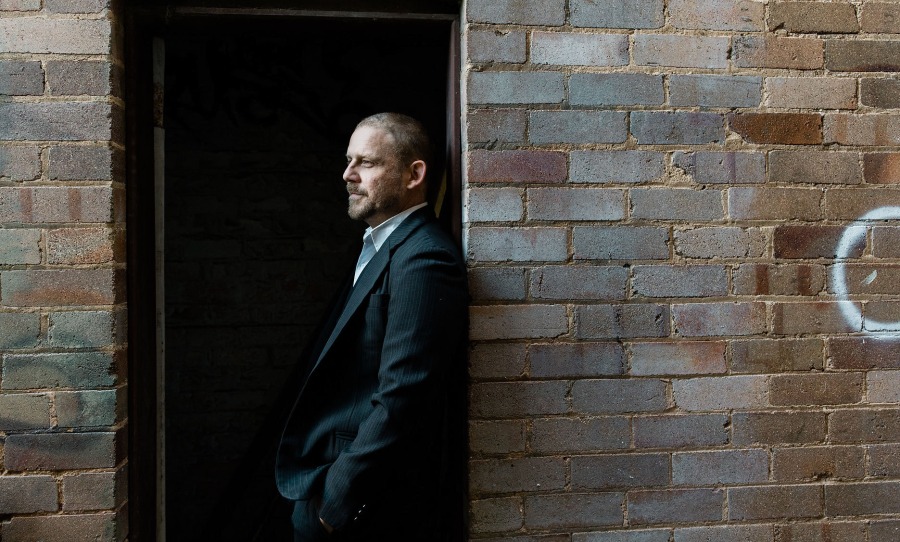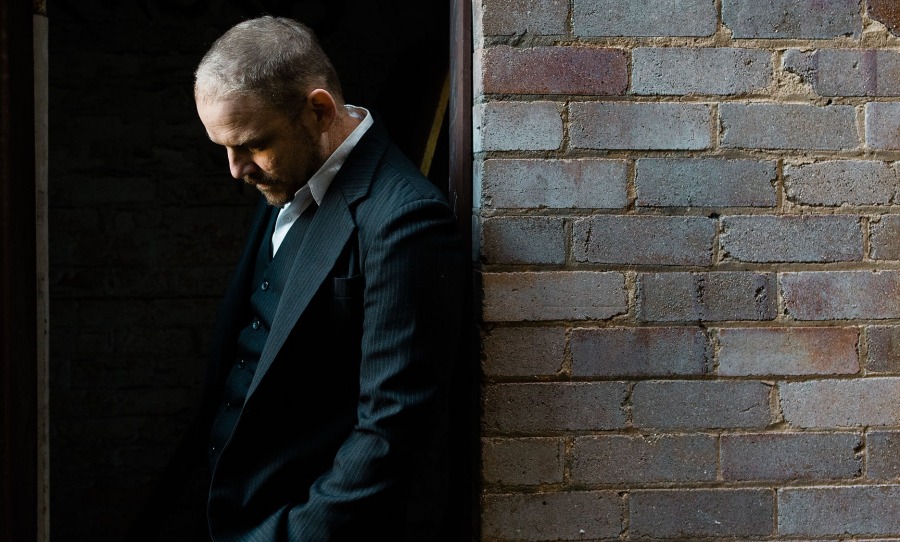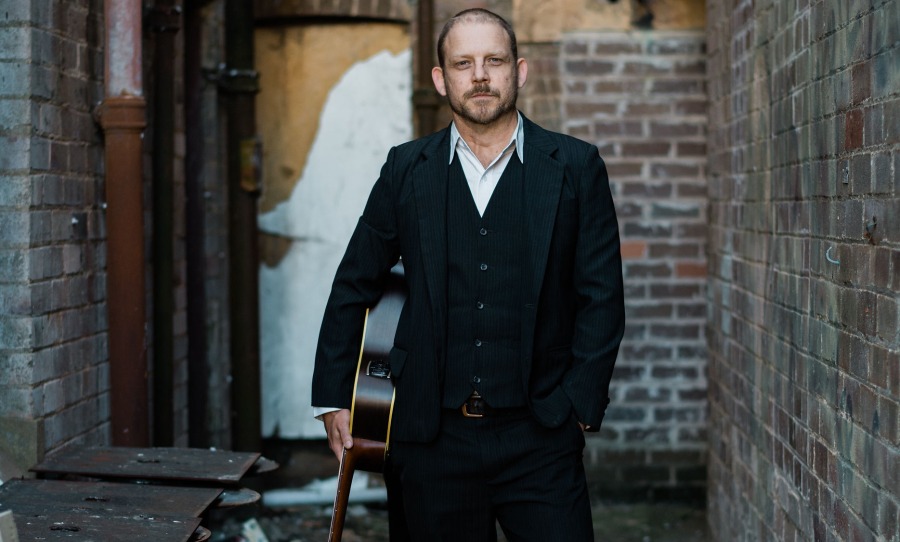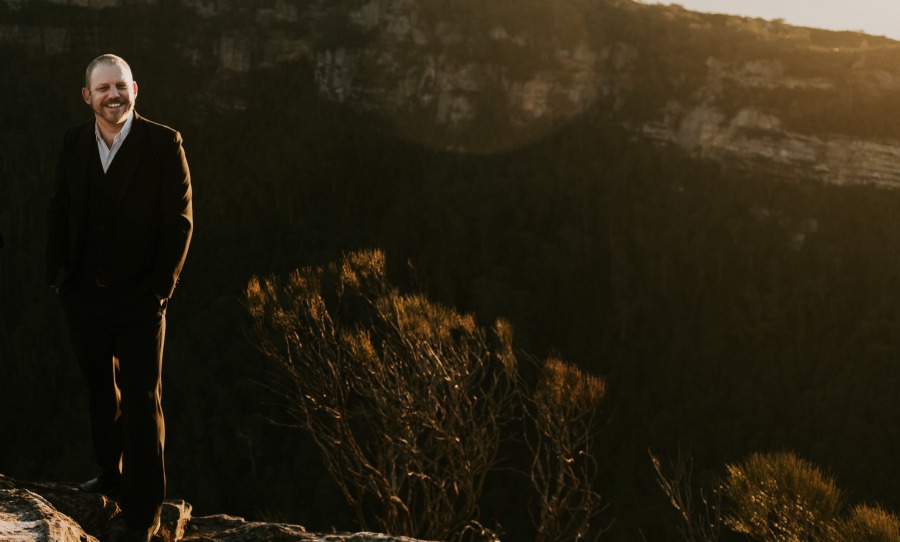Basking in the post-concert glow of his recent Stone Fields album launch, singer-songwriter Ben Connor talks all things fatherhood, philosophy, and the catharsis of overcoming adversity.
Equipped with his new record, singer-songwriter Ben Connor completed his album launch event in his hometown of Katoomba over the weekend. The sold-out gig drew attendees from as far away as the Central Coast, and by the singer’s own account, was populated by fans who “whooped, hollered” and “jived away.” With a setlist flanked by a full band and comprised of Connor’s latest drop Stone Fields, the crowd reaction is perhaps unsurprising.
The album, which arrived last week, dips into both melancholy and euphoria in equal measure, tracing everything from foregone love to parenthood and, on album closer, a blistering triumph over adversity. Now within a post-concert glow and with some deserved downtime on his hands, we caught up with Connor for a chat about his favourite philosophers, the creation of Stone Fields, and the rich songwriting territory of fatherhood.

HAPPY: You’ve discussed your latest single Photograph as having ‘protagonists’. How do you get into the mindset of a character when writing a song?
CONNOR: I don’t really. Well, at least not initially. I’m very much an intuitive songwriter. Good lyrics and poetry, as I see it, form a kind of bridge between the rational and irrational mind, so my songwriting process is generally about trying to tease out what’s going on below the surface. It’s a fishing expedition, but I’m catching a lot of fish and the fish ‘ain’t fish, they’re the weird and wonderful goings on of my unconscious.
With Photograph, probably because of what was going on in my life at the time, a distinctive theme of two people who loved each other but had personal issues getting in the way of their connection emerged. From this point, with a little more rational activity, I think my personal take on ego, in both its self-deflating and self-inflating forms, started piecing things together. It was at this point that you could probably say I empathised and consciously got into the mindset of the protagonists in the song.

HAPPY: So, the characters and storytelling in your lyrics are to some extent an exercise in fiction and to some extent based on your own experience?
CONNOR: I would say so, yes. With the degree of personal experience and fiction varying significantly with each song.
HAPPY: The music video for Photograph incorporates a kind of water-colour graphic style. Why did you choose the medium of animation for the single?
CONNOR: We were actually going to make a music video with actors in scenes similar to those in the animation. I spent a chunk of time applying for a grant through Create NSW, but didn’t get it. Miguel Valenzuela, the filmmaker I was going to make it with, is an old friend. He suggested that he could, on mate’s rates, make an animated version using computer graphic sets, photomontages and water colour puppets and for a third of the budget we had for the grant.
He sold me on the idea by showing me an animation by Marieka Walsh for a song by Elliott Wheeler called Baker Man, saying we could do something similar. You might want to share that video with your readers, actually. I think it’s bloody beautiful. Miguel then worked really hard and I think the result is incredible – especially the Terry Gilliam style photomontage when the train is moving through the city, and the dream sequence at the end when he becomes weightless and there’s fish in the clouds out the window.
HAPPY: You’ve discussed Stone Fields as involving themes of both melancholy, and the celebration in triumphing over adversity. Could you elaborate on this dichotomy throughout the album?
CONNOR: There’s a lot of deep and meaningful stuff going on in a lot of the songs on the album so talking about it is kind of inescapable. I guess I have had some pretty profound realisations over the period of time in which the songs were written and, as song writing is very much a kind of therapy for me, those realisations couldn’t help but make their way into my song writing.
Fundamentally, I’ve come to realise that as humans we tend to be in a permanent state of wanting. And while we sometimes get what we want, the pleasure is pretty short lived. While the motive appears to be pleasure, it also appears to be about proving that we are somehow important when everything seems to indicate otherwise. The result is this kind of anxiety gap between the way things are and the way we want them to be. And the greater the wanting, the greater the anxiety, which brings about a certain melancholy.

The more you ride the waves of the pleasure, anxiety and pain from all this wanting, the more you begin to see the whole process, and the thinking that goes along with it, as kind of ridiculous, and you start burning up your bullshit, so to speak. The more your bullshit burns, the more the pure life energy that animates your body and the world around you is experienced and you start to truly live.
This is a triumph. Photograph, Sailor, Little Wood Canoe, Quest, Rain and Full Moon Rising all deal with this dichotomy lyrically, and hopefully not too didactically.
HAPPY: Stone Fields explores themes of love and fatherhood, why is the latter topic so rich for music and storytelling?
CONNOR: I became a father 8 years ago when my daughter, Kira, was born. The effect on me of being responsible for this beautiful creature who was completely vulnerable and completely dependent on her mother and father to survive in the world, was dramatic to say the least. To then witness this blob of a thing that could do little more than eat, shit and piss slowly developing into a little human while stumbling, cutely mispronouncing and uncontrollably giggling every step of the way has been truly amazing.
I wrote Highland Girl about Kira when she was quite little. For the first two verses I was trying to capture the beautiful moments I had shared with her in those early years. I remember improvising pages and pages of lyrics to the melody before settling on the words I finally used in the song.
HAPPY: How did the track Kiss My Ass come about? Was it a cathartic song to record?
CONNOR: Kiss My Ass is a very old song that emerged out of a fun jam I had with my brother, Paddy, when visiting him and his family in Melbourne. I was on guitar and started playing this pretty run-of-the-mill chugging blues riff. As I recall, he joined in on piano, became possessed by one of the many characters he tends to get possessed by when he’s having a good time and started sputtering out ‘Kiss My Ass’ and wailing like a crazy person. It was hilarious, so I joined in and we both really got into it.
The idea kept coming back into my mind then late one night the spoken word lyrics of the first verse started coming to me. ‘I was really getting the shits with the arrogance and self-righteousness of certain people who seemed to spend most of their social interactions consolidating their positive opinions on themselves and their friends and putting down large chunks of the population with little empathy for the circumstances that had put them there. So those opening lyrics kind of bubbled up I think to proclaim that life is more complicated, and sad, and beautiful, than these people realise, and as a consequence, they can ‘kiss my ass’.
HAPPY: You’ve mentioned philosopher Albert Camus when describing the concept of Stone Fields. Any other favourite philosophers or poets who’ve influenced your work?
CONNOR: I wrote the song Quest after reading The Hero with a Thousand Faces by the comparative mythologist, Joseph Campbell. It’s a book about the hero’s journey, the narrative structure which Campbelll says is replicated in the myths of cultures throughout the world. The hero or heroine’s journey, put simply, is a journey we all go on in which the ego leaves the security of that which is safe and familiar, faces a series of challenges and is destroyed and reborn in a more integrated form.
Hoping that this universal plot would have universal appeal, I used a more directed version of my recorded improvisational song writing on Quest to replicate the three stages of the hero’s journey Campbell describes in, combining personal experience and mythological imagery along the way.
Other than Campbell, I try to regularly dip into all these compendiums of English, American and Australian poetry and prose that I have when I’m writing. Of these, the lushness of Keats’ poetry and the cultural criticism of Matthew Arnold I think has influenced my work a lot. The ‘realisations’ that I referred to above have also been significantly assisted (or perhaps ‘provided’ is a more correct way of putting it) by Eckhart Tolle’s books (the most profound books that I have
ever read), books I’ve read on Zen Buddhism and Taoism (the Tao Te Ching in particular) and Dan Siegel’s stuff on the science of mindfulness.
HAPPY: What song got the most notable reaction from audiences at your album launch event?
We had a really engaged and responsive audience at the launch on Saturday. The gig was sold out and the place was packed with friends and family who know how hard I worked on this album. Most of the songs got a good reaction, but I reckon there were two songs that stood out: Little Wood Canoe, the final guitar solo in particular and, you’re favourite, Kiss My Ass.
View this post on Instagram
There’s a great mobile phone video that a friend posted the next day of this awesome lady, who’s maybe in her 60’s, who apparently came all the way to Katoomba from the Central Coast for the gig. The moment Kiss My Ass started, she was out of her seat and jiving away while the crowd whooped and hollered. It was so good to watch.

HAPPY: You’ve been described as a musical lovechild of Leonard Cohen, Nick Cave and David Gray. How do these musicians inspire your sound, and what’s your favourite track by each?
CONNOR: I think that they inspire my sound just simply by being loved and regularly played on my stereo. That said, I listen to a lot of music and love a lot of other artists equally, if not more. I certainly don’t actively try to sound like them and I’m not entirely sure that I’m comfortable with the fact that I do, but the comparisons are generally agreed upon and if it helps people to get an idea of what I sound like and this makes them more inclined to check out my music, I’m all for it.
My favourite Leonard Cohen song is currently A Thousand Kisses Deep. My favourite Nick Cave song is currently Do You Love Me, And my favourite David Gray song is currently Disappearing World.
Interviewed by Tom Disalvo
Photos supplied.
